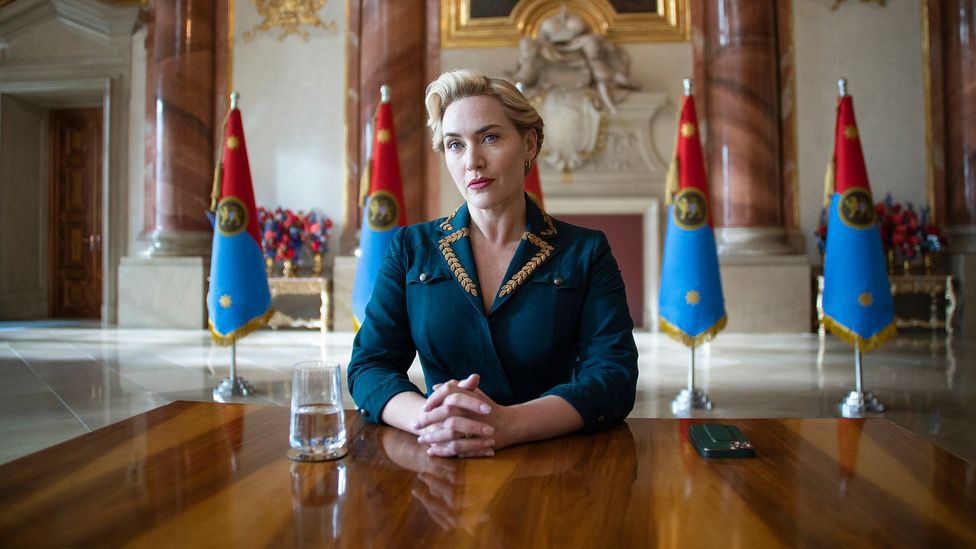When the world starts tilting toward authoritarianism, you can attack that reality with anger or undermine it with mockery. The Regime, an absurdist yet close-to-home satire, assumes that it's best to laugh to keep from crying. With a spectacular, funny and chilling Kate Winslet as the imperious chancellor of an unnamed, fictional Central European country, the captivating series is a comedy that never ignores the real-life, global dramas beneath it all.
More like this:
- Dune: Part Two is 'jaw-droppingly weird'
- The truth about Coco Chanel and the Nazis
- Avatar: The Last Airbender is 'the worst of remake culture'
The show was created by Will Tracy, who co-wrote the more scathing satirical film The Menu and has written for Succession. The Regime has more in common with comedies like Armando Iannucci's The Death of Stalin, less sharply skewering than farcical. Chancellor Elena Vernham's addresses to the country begin, "My Loves". She talks to her dead father, the founder of their right-wing political party, who is preserved in a glass coffin like Snow White. And at an official banquet, she takes to the stage to sing, off-key, Chicago's karaoke-ready If You Leave Me Now, her husband at the keyboard. But the show isn't called The Regime for nothing. As it goes on, we see that beneath Elena's silliness is a lethal will to power. One of Winslet's gifts is to make it look effortless as she sinks into characters, and she never winks at the camera here. She makes Elena a woman who believes her own lies and self-delusions. In her mind, she deserves to be dictator and what's wrong with that?
As the story begins, a soldier, Herbert Zubak (Matthias Schoenaerts) is brought to the palace to work for the Chancellor. The jaunty music, by the Oscar-winning composer Alexandre Desplat (The Grand Budapest Hotel and many other films) suggests he is a buffoon and sets the comic tone. But Zubak and his unit have been branded The Butchers for shooting into a crowd protesting conditions at a cobalt mine, killing 12. Elena likes that about him.
His first, ludicrous job is to indulge her hypochondria by walking in front of her with a device measuring moisture in the air because she is convinced the palace is full of black mould. In its weaker moments – here and among Elena's bumbling lackeys – The Regime can feel like Iannucci-light. By the end of the first episode, though, we see that Zubek is a violent sociopath, with a Rasputin-like hold on Elena. We know that Schoenaerts can be soulful in other parts, but here he gives Zubak a deranged look in his eyes, signalling that the only question is how much bad influence he will exert over the already-corrupt Chancellor.
The directors smoothly lure us into this cock-eyed world that shadows our own
The Regime was shot partly in Austria, in the gilded, opulent Schönbrunn Palace, the historical summer residence of the Hapsburgs. Mountains are visible in the background, but geography is less important than geopolitics. With her country initially under the thumb of the US economically, Elena begins to play East against West and tries to partner with China. As the story goes on and she becomes more unhinged, the series deftly balances comedy and drama, impinging on real-world connections in a light-handed way. Stephen Frears (The Queen) directed episodes one, two and four, and Jessica Hobbs (The Crown) the other three, and both directors smoothly lure us into this cock-eyed world that shadows our own.
Elena does not resemble one specific world leader but several figures. Vladimir Putin inevitably comes to mind, especially when we see how she has rivals arrested and hauled off to prison, or plots to invade a neighbouring country, claiming it was hers all along. Two years after Russia's incursion into Ukraine, the parallels are impossible to miss. But there is also a strand of Eva Peron, more from the musical Evita than from history, in her glam blonde look and her balcony speeches to what she is convinced is an adoring public. And many of her authoritarian tendencies are generic. She surveils ordinary citizens. She masquerades as a populist, giving an address while standing in a cabbage field to show her connection to farmers. She manipulates the media, spouting blatant lies and giving gaudy performances, dancing and singing Santa Baby as her Christmas video message to the country. Good taste is not her forte. It wouldn't be a surprise to see her hawking gold trainers, like Donald Trump.
But the story becomes darker and darker as it heads toward a sobering end, not necessarily the one you might think is coming. Along the way, Hugh Grant appears in episode four as Elena's leftist predecessor. Grant makes this surprising character wily and complicated in just a few scenes. It's too bad he only appears in that single, standout instalment. Andrea Riseborough plays the manager of the palace, fearfully trying to please Elena in order to protect her small son. Martha Plimpton appears in one episode as a US senator, whose one-on-one standoff with Elena is a delicious model, on both sides, of not saying what you mean but being perfectly clear. Ah, diplomacy.
From start to finish, The Regime's view of real-life politics and the state of the world is deeply cynical, but it's not hard to believe.
★★★★☆
The Regime is released 3 March on HBO and Max in the US and 8 April on Sky Atlantic and NOW in the UK.
If you liked this story, sign up for The Essential List newsletter – a handpicked selection of features, videos and can't-miss news delivered to your inbox every Friday.
